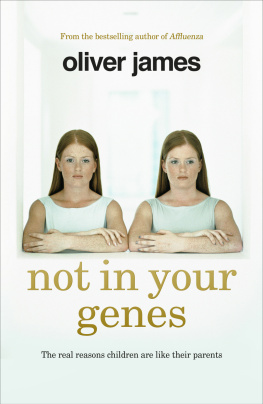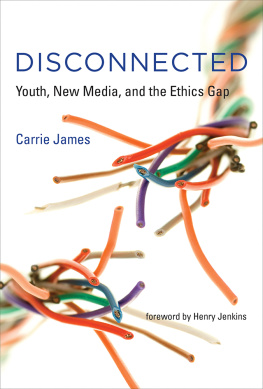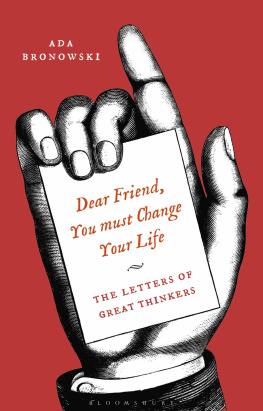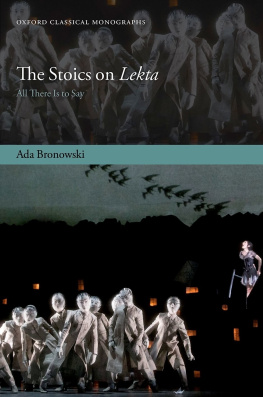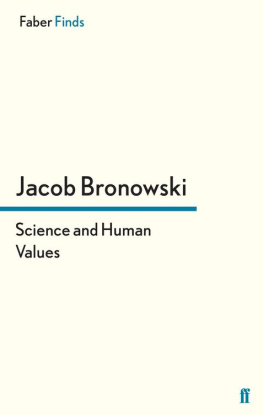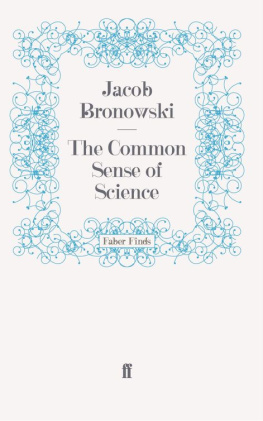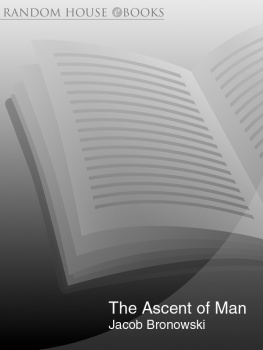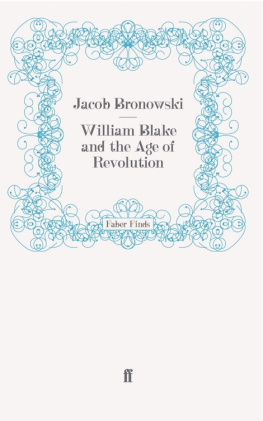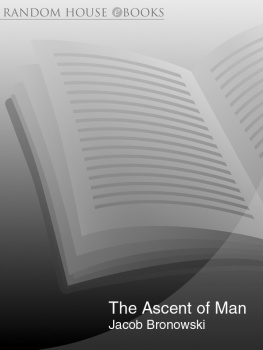The Happy Passion
A Personal View of Jacob Bronowski
Anthony James
SOCIETAS
essays in political
& cultural criticism
imprint-academic.com
2017 digital version converted and published by
Andrews UK Limited
www.andrewsuk.com
Copyright Anthony James, 2011, 2017
The moral rights of the author have been asserted.
No part of this publication may be reproduced in any form without permission, except for the quotation of brief passages in criticism and discussion.
Imprint Academic, PO Box 200, Exeter EX5 5YX, UK
I have scrupulously avoided footnotes in this book because I believe that most non-specialist readers (and, secretly, many specialist readers also) find them rather irritating. However, at the end of the book the reader will find a useful list of books and articles referred to in the text, set down in the order in which I refer to them. A.J.
For my wife and daughters and to the memory of my mother.
Science is a very human form of knowledge. We are always at the brink of the known, we always feel forward for what is to be hoped. Every judgement in science stands on the edge of error, and is personal. Science is a tribute to what we can know although we are fallible
-Jacob Bronowski
1. Introduction: Bronowskis Footprints
If it is possible to say that the underlying pessimism and disillusionment of the last seventy years, particularly the disillusionment with science, originated in a certain place, rather as we say that a certain dance originated in Charleston, then that place might well be Auschwitz. The very name, like that of Hiroshima, and perhaps in recent years the numbers 9/11, is used as a shorthand term to express certain attitudes such as hopelessness and helplessness. The events that these names and numbers represent are also used to justify political actions that are frequently dishonest and political beliefs that are frequently trivial and superficial. The simple truth that these events had causes that can be understood by the use of science and common sense is not nearly so often stated. The pessimism and the disillusionment are still with us today, as I write, and they were certainly with us eleven years ago in 1997 when I visited Auschwitz.
It was a brilliantly sunny day in early July, and we were travelling in a minibus from Krakow to Auschwitz through rich, rolling countryside full of the heavy greens of summer that can give you the oppressive sense of ploughing through an immense salad. Polish villages came and went, and the minibus radio babbled unconcernedly while the driver adjusted his sunglasses and concentrated on the road. There were six passengers in the minibus, four of them German - a couple in their twenties and a couple in their fifties. I dozed at odd moments, with images from the film Schindlers List coming back to me. No film can prepare you for Auschwitz, not even the terse and dignified documentary shown before you enter the camp itself, which was watched in shocked or respectful silence by the audience that filled the theatre. The camp appears rather suddenly in the village of Oswiecim and visitors alight in the car park, from which the main gate (not the point of entry for most of those who came to the camp as prisoners) can be seen some distance away. Above the gate is the inscription, mocking and cruel, ARBEIT MACHT FREI -Work Makes Free. The funeral march from Beethovens Eroica symphony was played over the film shown to visitors, perhaps as a conscious attempt to show that despite Auschwitz, human civilisation, and Germany as part of that civilisation, goes on.
There were piles, rank upon rank, of empty canisters that had contained Cyclon B crystals that produced the gas for the gas chambers, still bearing the manufacturers name, Degesch - a firm that made almost 300,000 marks in profits from the sale of the gas between 1941 and 1944. Prisoners came straight off the trains and were subjected to selection for immediate extermination or for work and later death by execution, beating, starvation or illness. Some prisoners died in the gas chambers after later selections. Jews from southern Europe were often told that they would be allowed to begin a new life as farm workers when they were rounded up. To prevent mass panic the SS told people that they would be allowed a shower and must undress, and after this, about two thousand people would be herded into a room of two hundred and ten square metres and the gas would be pumped in. It took about fifteen to twenty minutes to die, after which the gold in the teeth, rings, earrings, and even the hair would be removed from the bodies. The corpses were then burnt in incinerators on the ground floor. At the selections some of the prisoners knew or guessed their fate and there occurred scenes of such anguish and despair that even the SS men had to be given extra rations of vodka in order to continue with their duties. Mothers trying to protect young children were particularly troublesome.
We went into the block that houses the exhibition on the sufferings of Hungarian prisoners, and suddenly the lights failed and we were left to edge our way out in nearly complete darkness. Nothing that could happen in the camp today, perhaps, could have prepared the mind so well for the rest of what we saw. There was a bank of human hair behind a huge glass wall, not a pile or a heap, but a bank, sloping and stretching up and back, thick with dust. If every member of the audience in a large, packed concert hall suddenly had his or her hair shorn off, it would leave something like the amount of hair at which we now stood looking. Here and there, fair hair stood out, including a yellow plait as thick as my wrist. Some nameless yellow-haired girl, such as the poet Yeats might have celebrated, had died crushed together with two thousand others in a chamber two hundred and ten metres square. The efficiency of Heinrich Himmlers planning permeated everything done at Auschwitz. There was a similarly vast array of shoes, boots and sandals, and of cups, tureens and mugs, and of crutches taken from the disabled, artificial limbs, braces taken off childrens legs and spectacles. All were to be recycled - the hair was used as fibre in making cloth for instance - in order to provide products for Hitlers Reich. In one block were some of the photographs of the children taken by the SS for the camp records, faces twisted with fear, fresh tears glistening on their cheeks. In a glass case was preserved a little woollen cardigan large enough for a child of three, and in another was a doll with part of its face shattered and the fragments placed carefully beside it. I went down the stairs and outside, unable to stop myself from crying openly and not even trying. A young woman in jeans sat on the steps to this block, trying to collect herself, glancing as numbly at my weeping as she looked at everything else. And yes, it is true, the birds do not sing inside the camp.
I went over to the perimeter fence upon which some of the prisoners killed themselves by throwing themselves on the electrified wire. Although no longer electrified, the wire is still there, as is the barbed wire.
You have come to a concentration camp, from which the only way to escape is through the crematorium chimney. Thus, the prisoners who were not immediately selected for the gas chambers on arrival would be informed by the camp supervisor. Large numbers died from hard labour, often performed at a run without respite, and they were subjected to constant casual beatings from the SS and the common criminals who were their assistants. Survivors who have artistic abilities have provided a series of pictures of the daily lives of the prisoners, from reveille through the bowl of soup in the morning to the bowl of soup in the evening, from morning roll call to evening roll call, and above all at work. The overfed common criminals, laughing, leering, swung their sticks and clubs and wounded and maimed emaciated prisoners or beat them to death on the spot. This was not always the case however, because some Germans, convicted as common criminals and given power over ordinary prisoners, behaved with decency and humanity.
Next page

